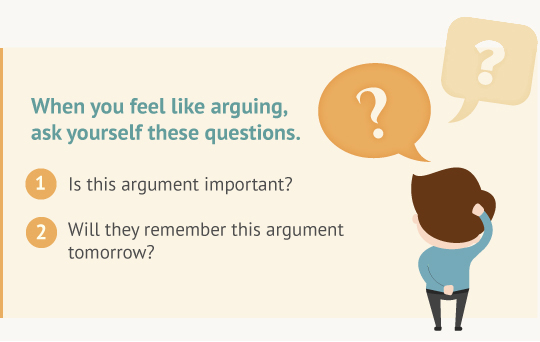Florence loves to cook, but she also has dementia. She walks into her kitchen every afternoon and wants to make a meal for her family, who she lives with. The problem is that she forgets to turn off the stove and sometimes walks out halfway through, leaving behind a half cooked pot of spaghetti and a stove burner set to medium heat.
For the Nomura family, their problem is solved by allowing Florence to do the cooking she wants, and then her daughter or son-in-law will finish up once she walks out of the kitchen. This way she is able to maintain a feeling of independence and happiness instead of arguing every day that she has the capacity to still cook like she used to.
When a loved one has dementia, it’s natural to grow frustrated with their shortcomings and try to correct their mistakes. However, because of the changes that are occurring in their brain, their perception of memories becomes distorted. That means arguing your point won’t change their mind but it will cause frustration, fear, and confusion, leaving both of you feeling bad.

Know your intentions before interacting with your loved one. If their persistence on doing something poses a serious emotional or physical health concern, decide how to calmly handle the situation without turning heated.
Common Arguments
Every dementia patient is different, but there are common patterns that frequently spark arguments between loved ones.
Your mom is insisting that you stole her necklace. Validate her complaint and offer a suggestion—“Oh, you lost your favorite necklace? Why don’t we see if we can find it. Let’s check the kitchen first.”
Grandma is refusing to go home with you because she must wait for her husband to pick her up, even though you know he passed away a few years ago. Never ask “Don’t you remember…?” She will feel bad about forgetting and then you will have to deal with the emotional response that comes with relearning that her husband is no longer living. Instead say, “He’s running late and asked me to pick you up.”
Your loved one is telling you a story, recalling facts that are untrue and getting names mixed up. Don’t correct them—that won’t improve their memory and it will cause confusion and sadness. Go along with their story and treat them as you would if what they were saying was factual.
Your dad is adamant that he hasn’t had anything to eat all day even though you just fed him lunch half an hour before. Instead of demanding that he remember the truth, give him a light snack to satisfy him.
Dementia is not a choice and no argument will ever change the course of their memory. When a loved one develops this disease, your goal becomes to remove any immediate stress that comes with memory loss. When they become agitated, it’s even harder to think clearly and logically.
Living with loved ones who have dementia is no easy task and can be overwhelming. If you need a break for a few hours during the day or week, consider respite care. Home Care by ALTRES Medical offers a respite program that could help you. Give us a call at (808) 591-4930 to learn more or to schedule a free in-home consultation.
This article is for general health purposes only and does not constitute medical advice nor is it intended to diagnose health problems. Readers should first consult with their physician or health care provider before acting upon any information in this article.


Florence loves to cook, but she also has dementia. She walks into her kitchen every afternoon and wants to make a meal for her family, who she lives with. The problem is that she forgets to turn off the stove and sometimes walks out halfway through, leaving behind a half cooked pot of spaghetti and a stove burner set to medium heat.
For the Nomura family, their problem is solved by allowing Florence to do the cooking she wants, and then her daughter or son-in-law will finish up once she walks out of the kitchen. This way she is able to maintain a feeling of independence and happiness instead of arguing every day that she has the capacity to still cook like she used to.
When a loved one has dementia, it’s natural to grow frustrated with their shortcomings and try to correct their mistakes. However, because of the changes that are occurring in their brain, their perception of memories becomes distorted. That means arguing your point won’t change their mind but it will cause frustration, fear, and confusion, leaving both of you feeling bad.

Know your intentions before interacting with your loved one. If their persistence on doing something poses a serious emotional or physical health concern, decide how to calmly handle the situation without turning heated.
Common Arguments
Every dementia patient is different, but there are common patterns that frequently spark arguments between loved ones.
Your mom is insisting that you stole her necklace. Validate her complaint and offer a suggestion—“Oh, you lost your favorite necklace? Why don’t we see if we can find it. Let’s check the kitchen first.”
Grandma is refusing to go home with you because she must wait for her husband to pick her up, even though you know he passed away a few years ago. Never ask “Don’t you remember…?” She will feel bad about forgetting and then you will have to deal with the emotional response that comes with relearning that her husband is no longer living. Instead say, “He’s running late and asked me to pick you up.”
Your loved one is telling you a story, recalling facts that are untrue and getting names mixed up. Don’t correct them—that won’t improve their memory and it will cause confusion and sadness. Go along with their story and treat them as you would if what they were saying was factual.
Your dad is adamant that he hasn’t had anything to eat all day even though you just fed him lunch half an hour before. Instead of demanding that he remember the truth, give him a light snack to satisfy him.
Dementia is not a choice and no argument will ever change the course of their memory. When a loved one develops this disease, your goal becomes to remove any immediate stress that comes with memory loss. When they become agitated, it’s even harder to think clearly and logically.
Living with loved ones who have dementia is no easy task and can be overwhelming. If you need a break for a few hours during the day or week, consider respite care. Home Care by ALTRES Medical offers a respite program that could help you. Give us a call at (808) 591-4930 to learn more or to schedule a free in-home consultation.
This article is for general health purposes only and does not constitute medical advice nor is it intended to diagnose health problems. Readers should first consult with their physician or health care provider before acting upon any information in this article.